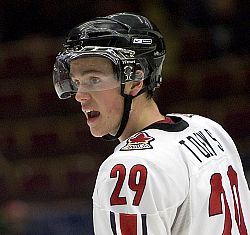Click for a pictorial by Melissa Wade
The United States lost to two-time defending champion Canada, 2-1, in a seven-round shootout in the semifinals of the 31st annual International Ice Hockey Federation World Junior Championship.
Team USA played on 18 hours rest after it defeated Finland in quarterfinal action Tuesday evening, while top-seeded Canada hadn’t played since New Year’s Eve.

“We gave a gutsy effort,” said U.S. head coach Ron Rolston. “I couldn’t have asked our guys to do more. Their goaltender made some key saves and our goaltending was just excellent as well. Our players can hold their heads high. They did everything we asked of them.”
Team USA will play for the bronze medal Friday at 4 p.m. against host Sweden.
The teams fired 20 shots on goal in the opening period — 11 by the United States — but both goaltenders were solid. U.S. netminder Jeff Frazee made a big save on a Steve Downie power-play attempt from the side of the goal midway through the period and also stopped Darren Helm on a shorthanded break late in the period.
Team USA got the only goal of the second period. It came at 5:04 on the power play when Taylor Chorney’s pass from the bottom of the left circle across the crease intended for Nate Gerbe hit Marc Staal’s skate and deflected past Canadian netminder Carey Price.
Frazee was again outstanding in goal. While Canada had only six shots, he made two huge stops in the period, including one in which he slid across to rob Bryan Little on a rebound of Downie’s original attempt. Frazee also stoned Downie on a break down the right side with just more than four and a half minutes to go in the period.
Canada tied the game on its fourth straight power-play opportunity at 12:19 of the third period when Luc Bourdon’s shot from the point sailed over the shoulder of Frazee. It was the only goal of the period.
In the 10-minute overtime, which was played with the teams skating four-on-four, Team USA dominated. The U.S. had a 12-2 shots advantage, including several great chances on a power play midway through. Perhaps Team USA’s best chance came just after the power play expired when Erik Johnson made a nifty backdoor pass to Patrick Kane from the left point, but Kane’s deflection from the side of the net went over the cage.
That set the stage for what turned into a dramatic seven-round shootout. After Canada’s Downie and the United States’ Kane were both stopped to start the shootout, Little gave Canada a 2-1 lead. Peter Mueller tied the shootout, but Jonathan Toews put Canada ahead 3-2, forcing the U.S. to score. It did just that, thanks to Jack Johnson’s blast to the stick side.
Little failed in the fourth round, meaning a goal by the U.S. would send it to the gold-medal game. Kane made a slick move in front, but Price made a save that carried him partially back into his own net with the puck squeezed between his pads. Toews scored in the fifth round to give Canada the advantage, but Mueller went high under the crossbar to even the shootout again.
Andrew Cogliano of Team Canada started the sixth round with a shot that beat Frazee low to the glove side, but again the U.S. answered as Jack Johnson put one up high on the stick side of Price to force a seventh round.
Toews scored again, before Mueller’s attempt to send the shootout to an eighth round was turned aside.
Frazee finished with 26 saves, while Price had 34 stops.
Friday’s bronze-medal game can be heard live on usahockey.com with Jim Rich and Jeff Sauer. In addition, NHL Center Ice will provide live television coverage of the game in the United States.
NOTES: Jeff Frazee was named the U.S. Player of the Game… During the first intermission of the Sweden-Russia semifinal, the IIHF conducted a press conference to clarify the situation relating to Patrick Kane’s second shootout attempt. The question centered around why the referee did not use video replay to review the play as it appeared Canada netminder Price may have carried the puck back over the goal line with him into the net. The IIHF said that the play was reviewed following the game and there was no evidence that showed the puck crossing the goal line… The 2007 IIHF World Junior Championship features athletes under the age of 20 on international teams including the United States, Belarus, Canada, Germany, Czech Republic, Finland, Russia, Slovakia, Sweden and Switzerland… The U.S. National Junior Team is coming off a fourth-place finish at the 2006 World Junior Championship in Vancouver, British Columbia.

